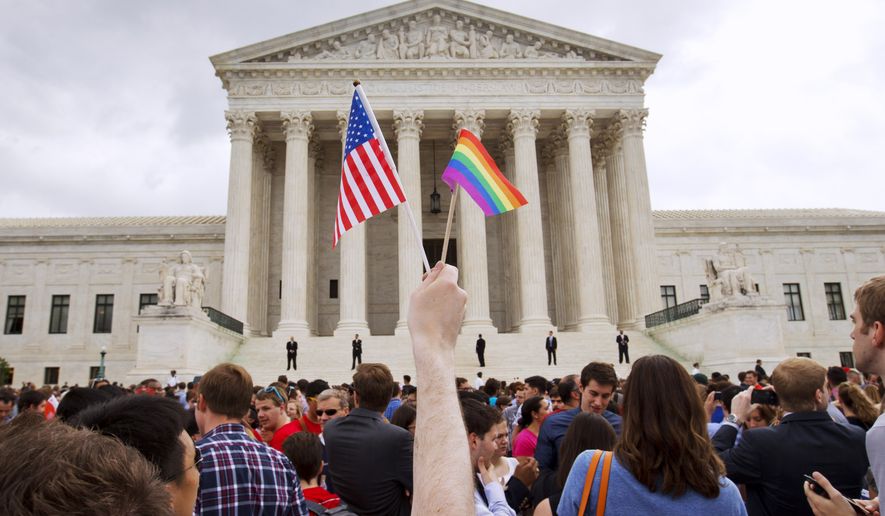OPINION:
When Anthony Kennedy testified before the U.S. Senate three decades ago as Ronald Reagan’s nominee for the Supreme Court, he professed great deference to the Constitution and the separation of powers.
The American constitutional experience had been so successful, he testified, because the framers were brilliant in writing the founding document, Americans were allegiant to the rule of law and the three separate branches of government respected the lines dividing them.
We think Justice Kennedy was right then, and we think he — and his rationale — were wrong last month when he wrote the majority opinion finding a constitutional right to same-sex marriage.
Justice Kennedy blew past the line separating the judiciary from the executive branch, and its responsibility to enforce policy, and the legislative branch and its responsibility to make law. He employed emotional and political language and little legal acumen.
His ruling poses a threat to America’s great constitutional democracy, emboldening jurists top to bottom of the judicial system to legislate and politicize issues with little regard for the restraint the Founding Fathers placed in the Constitution.
The decision of Congress and the states for two centuries has been to define marriage as a union between a man and a woman. We believe that was the right call. Just as important, we believe it the right of Congress and the states to write this definition, not the courts.
Mr. Kennedy’s judicial overreach poses a second threat, unrelated to whether gay couples can obtain a marriage license. President Obama says the ruling has settled the gay marriage issue now and forever. But as the smoke over the landmark ruling clears, a new threat rises to the religious liberty of Americans who don’t want to participate in gay weddings. From bakers to pastors, florists to photographers, the fear of being brought to court or punished by the IRS unless they participate in gay weddings, despite their religious beliefs, is a genuine fear.
Anyone who opposes same-sex marriage now must be banished forever to outer darkness, decried as a bigot. Liberal propagandists have begun to argue that the IRS should review the tax status of churches and nonprofit organizations that oppose same-sex marriage on religious grounds. In his dissent from the same-sex ruling, Chief Justice John Roberts warned of this darker consequence of Justice Kennedy’s ruling. “The most discouraging aspect of today’s decision,” he said, “is the extent to which the majority feels compelled to sully those on the other side of the debate. These apparent assaults on the character of fair minded people will have an effect, in society and in court. Moreover, they are entirely gratuitous … [i]t is one thing for the major-ity to conclude that the Constitution protects a right to same-sex marriage; it is something else to portray every-one who does not share the majority’s ’better informed understanding’ as bigoted.”
The Supreme Court renders decisions, and it should surprise no one that sometimes its decisions are, well, wrong. The Court was wrong when it concluded in the Dred Scott decision in 1857 that blacks had no rights as citizens, it was wrong when it upheld segregation and “separate but equal” in Plessy v. Ferguson in 1896, and the Court was wrong when it upheld the constitutional validity of same-sex marriage. A third wrong, of trampling on the religious liberties of Americans, would be the final injury of this wrongheaded decision.




Please read our comment policy before commenting.